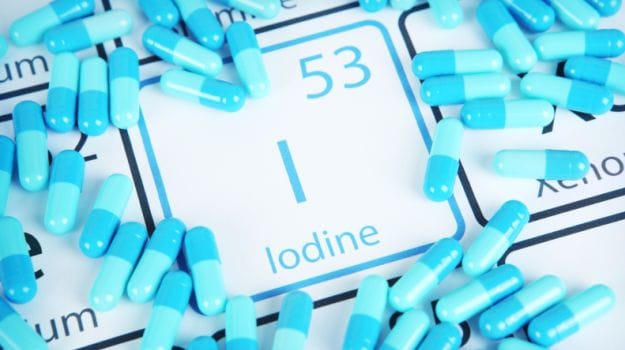Minerals and vitamins are vital for a healthy life. They play a significant role in the physical and mental development of humans from conception itself. The main micronutrient deficiencies which are creating public health problems worldwide are iodine, iron, folic acid, vitamin A and zinc. Iodine is very important for our bodily functions. What is Iodine?Iodine is an essential dietary mineral that is stored in the thyroid gland. It is essential for the production of thyroid hormones thyroxine (T3) and triiodothyronine (T4). Thyroid hormones affect all the cells in the human body, they are important for the proper development of cells. They play a crucial role in increasing the metabolic rate of the body, in protein metabolism; regulate the growth of long bones and for the development of the brain. Thyroid hormones are closely linked to protein, fat and carbohydrate metabolism in cells.
(Also Read: World Iodine Deficiency Day 2020: Ideal Salt Intake For Your Age And Condition)
Iodine is an essential dietary mineral. Image Credit: istock
The Indian Iodine Story
Iodine deficiency is a reality in India because the soil in our part of the world is iodine deficient; especially in the North and North Eastern States. It is estimated that 350 million people are at risk of iodine deficiency disorders. To combat this, common salt was fortified with iodine; which now reaches about 91% of households in the country. However, adequate consumption of iodized salt is only 71%. Did you know: Iodine deficiency disease (IDD) is the largest cause of preventable brain damage?How Much is Enough?Iodine is not made in our body; we get our share through the food and water we ingest. Recommended allowances (ICMR 2010) for various age groups are as follows:
 Iodine DeficiencyIodine deficiency can lead to goitre (enlargement of thyroid), hypothyroidism and mental retardation in infants and children whose mother was iodine deficient during pregnancy. Women who are planning a family should start having adequate amounts of iodine in their diet to build up good stores before getting pregnant. Pregnancy and lactation also demand higher intakes to make adequate thyroid hormones, which play a crucial role in the baby's brain development.Sources of IodineSalt: In India, sale of non-iodized salt is banned. This makes salt the single most important source of iodine for Indians. Daily intake of 10g of iodized salt with 15ppm of iodine provides 150µg/day. The average salt intake in Indian homes range from 5-10g/day, 30% is lost during cooking and 70% is absorbed, providing an average amount of 70µg/day.
Iodine DeficiencyIodine deficiency can lead to goitre (enlargement of thyroid), hypothyroidism and mental retardation in infants and children whose mother was iodine deficient during pregnancy. Women who are planning a family should start having adequate amounts of iodine in their diet to build up good stores before getting pregnant. Pregnancy and lactation also demand higher intakes to make adequate thyroid hormones, which play a crucial role in the baby's brain development.Sources of IodineSalt: In India, sale of non-iodized salt is banned. This makes salt the single most important source of iodine for Indians. Daily intake of 10g of iodized salt with 15ppm of iodine provides 150µg/day. The average salt intake in Indian homes range from 5-10g/day, 30% is lost during cooking and 70% is absorbed, providing an average amount of 70µg/day.
Check with your doctor before adding too much iodine to your diet
Photo Credit: iStock
Bread: Thanks to the iodized salt rule, the iodine content in bread is considerable at 25µg/100 g. Two slices of bread would be good, choose the multigrain variety for a healthier option.Milk: It is another source of iodine with 303µg/litre. Milk is also a great source of protein, vitamins and important minerals like calcium. Half a litre of milk is the minimum quantity needed by adults to obtain the 150µg RDA.

Milk is a good source of vitamins and minerals including iodine.
Yogurt: If you are intolerant to lactose, dahi or yogurt is another healthy option for getting iodine from milk. Probiotics in dahi also improve gut health.Sea Vegetables: Kelp and wakame are extremely high in iodine content. They are also great sources of iron, antioxidants and other beneficial nutrients, which make them a nutritious choice.Sea Food: Sardines, tuna, shrimps, cod and scallops, all are considered excellent sources of iodine. Besides, seafood also provides the essential omega-3 fatty acids.
Eggs: Yolks of eggs are another source of iodine, great for children as they provide another essential "brain nutrient" folate too.Vegetables and Fruits: Sweet potato, onion, spinach, banana, and cantaloupe contain iodine. Strawberry provide about 13µg/cup.Adversaries: Foods containing thiocyanates interfere with the uptake of iodine by the thyroid gland. If you are on supplements or prone to iodine deficiency, eliminating or reducing the intake of cassava, soy, bok choy, broccoli, cabbage, cauliflower, mustard greens, turnip may be a good strategy.Iodine supplementation should only be done under medical supervision. Eating a healthy and varied diet is adequate to meet your iodine needs. Complete elimination of iodized salts or substitution with unfortified rock salt is not a good strategy. People with hypertension or heart diseases may reduce their salt intake but ensure that they take other good sources of iodine regularly.





